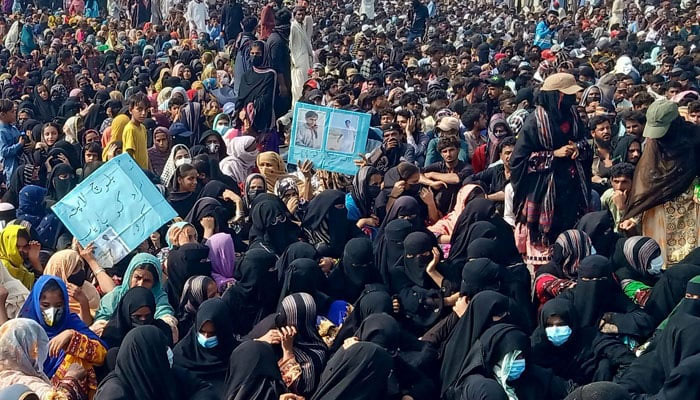Endless violence
Fundamental issue that needs urgent redressal is political and economic alienation of Balochistan’s people
As Pakistan sees another Eid, the situation in Balochistan continues to remain grim with the latest suicide attack near a Balochistan National Party-Mengal (BNP-M) sit-in at Lak Pass in Mastung on Saturday showing just how bad the escalating violence in the province is. Former lawmaker Akhtar Mengal, who has been leading a long march against the crackdown on Baloch Yakjehti Committee (BYC) activists, narrowly escaped unharmed. But the attack is just one in a series of deadly incidents that have shaken Balochistan this month alone. From the targeted killing of passengers on a Karachi-bound bus in Gwadar’s Kalmat area to the murder of labourers and police personnel in Kalat and Noshki, to the recent bomb attack on a paramilitary convoy along the Nushki-Dalbandin highway -- violence has become a defining feature of life in Balochistan. The destruction of railway tracks and the hostage crisis involving passengers of the Jaffar Express are disturbing examples of militant groups, particularly the Balochistan Liberation Army (BLA), gaining ground.
The security situation has deteriorated to such an extent that authorities have restricted night travel on national highways in several districts, effectively conceding control of the region after dark. This is now no longer a mere insurgency but an all-out war. With reports of collusion between the BLA and the Tehreek-e-Taliban Pakistan (TTP), along with credible allegations of foreign involvement, Pakistan faces a deeply entrenched security dilemma. While the military continues kinetic operations against terrorist outfits, including the killing of six militants in a recent intelligence-based operation in Kalat, it is increasingly clear that a security solution alone will not end the crisis. The fundamental issue that needs urgent redressal is the political and economic alienation of Balochistan’s people. The federal government’s approach -- arresting BYC leaders such as Mahrang Baloch and Sammi Deen Baloch under broad charges, including terrorism and incitement -- has only deepened resentment among the Baloch.
Pakistan has long conflated Baloch nationalism with terrorism, but this has only served to push more disillusioned youth towards militant outfits. A meaningful solution must involve a transparent and inclusive political process, which includes an end to enforced disappearances, genuine dialogue with Baloch representatives, and free and fair elections that empower elected Baloch leaders. The instability has also severely affected education in the province. Universities, including Sardar Bahadur Khan Women’s University, the University of Balochistan, BUITEMS and the University of Turbat, suspended on-campus classes due to security concerns earlier this month. Many students have been forced to shift to online learning -- a major challenge in a province where internet accessibility is already limited due to chronic government-imposed restrictions. The closure of universities is not just a setback for education but a symptom of a state that has failed to provide even the most basic security to its people. Generations in Balochistan have grown up amidst war, violence and disillusionment. The only true hope for breaking this cycle lies in education and economic opportunities. But if the government continues to treat Balochistan as a battlefield rather than a province of its own people, the situation will only worsen. It is time for the state to take a step back from its repressive tactics and prioritise genuine reconciliation. All this must of course also take into account the fact that terror must not and cannot be allowed to fester, and BLA's actions count as terror.
-
 Inside Dylan Efron's First 'awful' Date With Girlfriend Courtney King
Inside Dylan Efron's First 'awful' Date With Girlfriend Courtney King -
 'Sugar' Season 2: Colin Farrell Explains What Lies Ahead After THAT Plot Twist
'Sugar' Season 2: Colin Farrell Explains What Lies Ahead After THAT Plot Twist -
 ‘Revolting’ Sarah Ferguson Crosses One Line That’s Sealed Her Fate As Well As Andrew Mountbatten-Windsor’s
‘Revolting’ Sarah Ferguson Crosses One Line That’s Sealed Her Fate As Well As Andrew Mountbatten-Windsor’s -
 AI Rivalry Heats Up As Anthropic Targets OpenAI In Super Bowl Ad
AI Rivalry Heats Up As Anthropic Targets OpenAI In Super Bowl Ad -
 Kate Middleton, Prince William Share Message Ahead Of Major Clash
Kate Middleton, Prince William Share Message Ahead Of Major Clash -
 Is Dark Matter Real? New Theory Proposes It Could Be Gravity Behaving Strangely
Is Dark Matter Real? New Theory Proposes It Could Be Gravity Behaving Strangely -
 Viral AI Caricature Trend: Is Your Personal Data Really Safe?
Viral AI Caricature Trend: Is Your Personal Data Really Safe? -
 Lil Jon’s Late Son, Nathan Smith Spoke Highly Of His Father Before His Tragic Death
Lil Jon’s Late Son, Nathan Smith Spoke Highly Of His Father Before His Tragic Death -
 China Boosts Reusable Spacecraft Capabilities By Launching For The Fourth Time
China Boosts Reusable Spacecraft Capabilities By Launching For The Fourth Time -
 Bianca Censori On Achieving 'visibility Without Speech': 'I Don't Want To Brag'
Bianca Censori On Achieving 'visibility Without Speech': 'I Don't Want To Brag' -
 'Concerned' Prince Harry Future Plans For Lilibet, Archie Exposed
'Concerned' Prince Harry Future Plans For Lilibet, Archie Exposed -
 Skipping Breakfast? Here Are Some Reasons Why You Shouldn't
Skipping Breakfast? Here Are Some Reasons Why You Shouldn't -
 Billie Eilish Slammed For Making Political Speech At Grammys
Billie Eilish Slammed For Making Political Speech At Grammys -
 Beverley Callard Announces Her Cancer Diagnosis: 'Quite Nervous'
Beverley Callard Announces Her Cancer Diagnosis: 'Quite Nervous' -
 WhatsApp May Add Instagram Style Close Friends For Status Updates
WhatsApp May Add Instagram Style Close Friends For Status Updates -
 Winter Olympics Officially Open In Milan, Cortina With Historic Dual Cauldron Lighting
Winter Olympics Officially Open In Milan, Cortina With Historic Dual Cauldron Lighting




